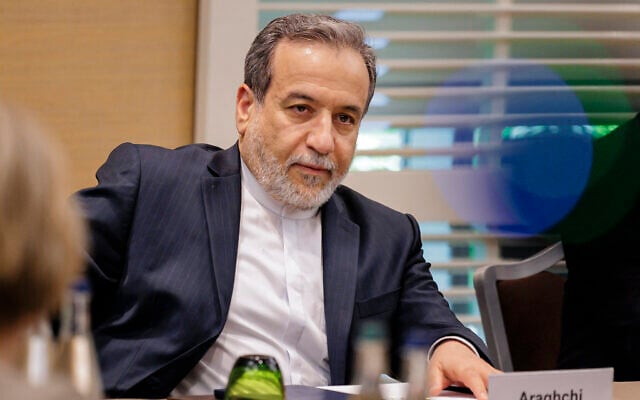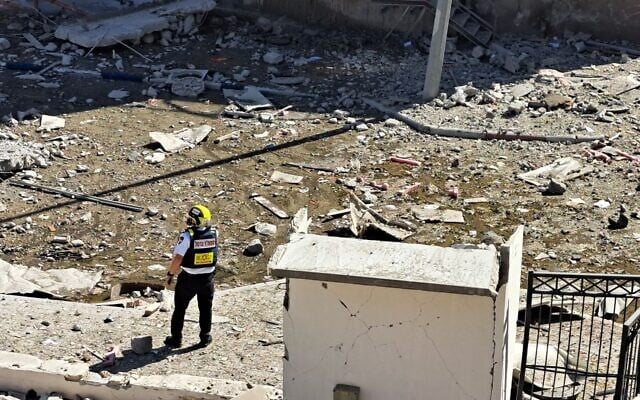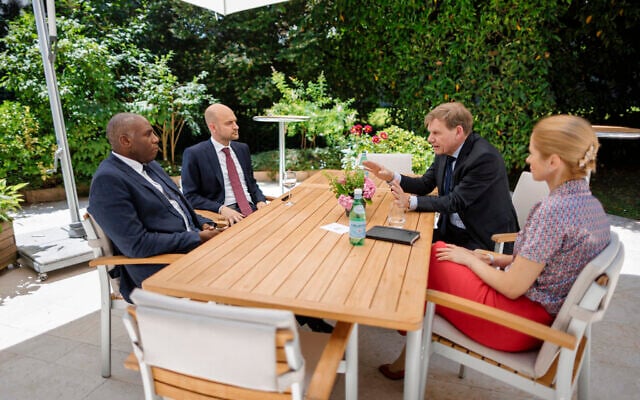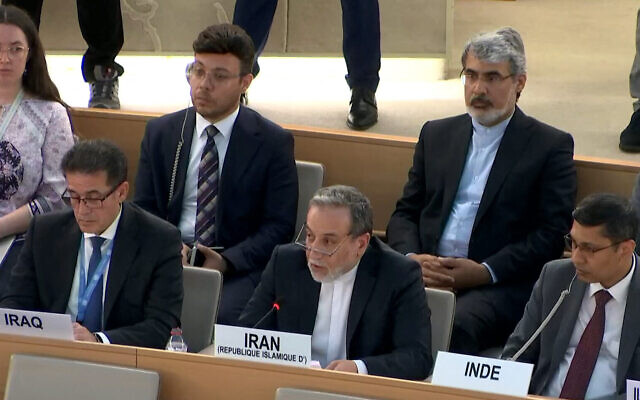


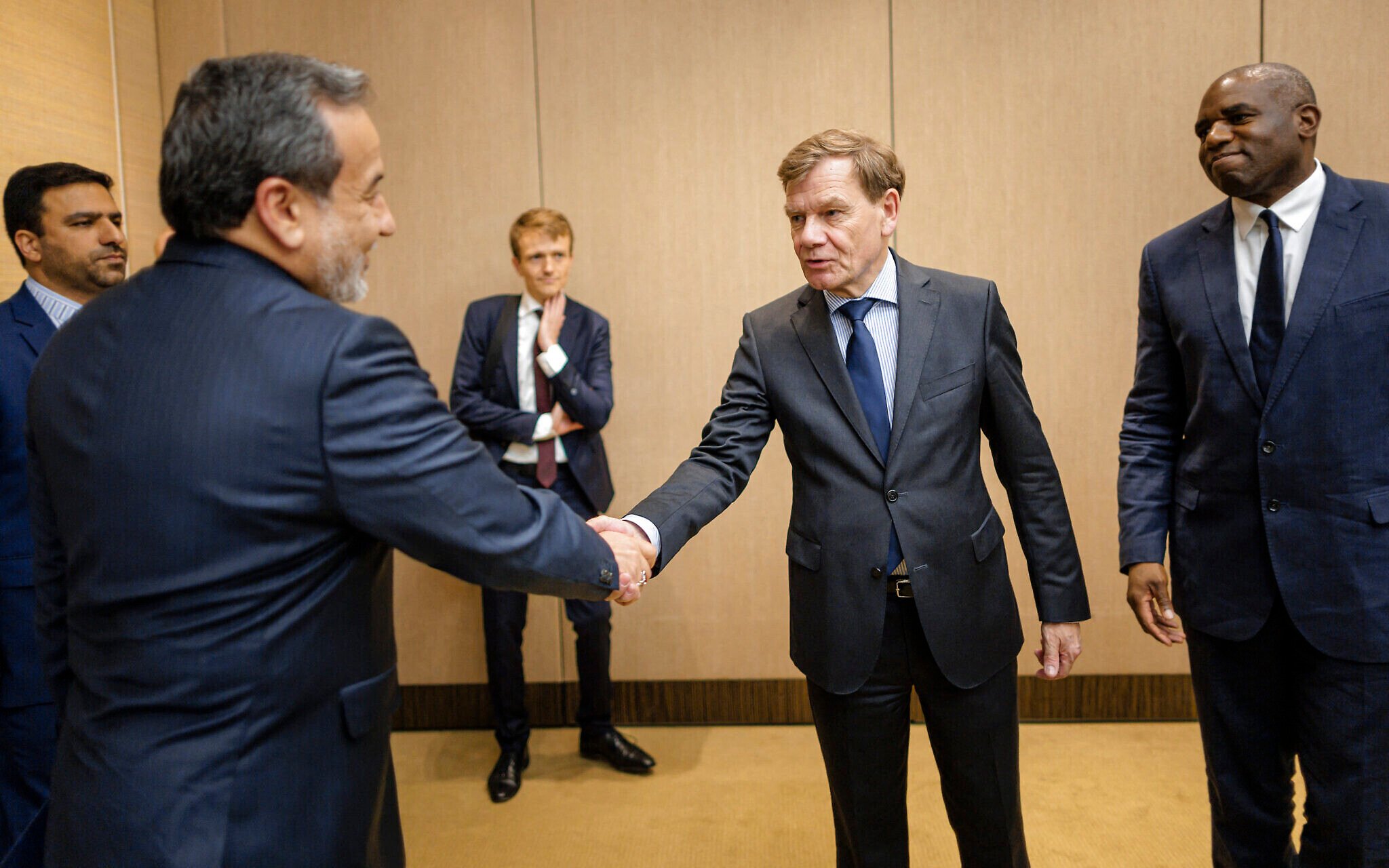
A meeting between Iran’s foreign minister and top European diplomats on Friday yielded hopes of further talks but no indication of any immediate concrete breakthrough, a week after the crisis centered on the Iranian nuclear program erupted into war between Israel and Tehran.
Foreign ministers from Britain, France and Germany, as well as the European Union’s foreign policy chief, emerged from talks at a Geneva hotel about 3 1/2 hours after Iran’s Abbas Araghchi arrived for the meeting.
It was the first face-to-face meeting between Western and Iranian officials since the start of the conflict.
“The good result today is that we leave the room with the impression that the Iranian side is fundamentally ready to continue talking about all important issues,” German Foreign Minister Johann Wadephul said. He said the two sides had held “very serious talks.”
British Foreign Secretary David Lammy said that “we are keen to continue ongoing discussions and negotiations with Iran, and we urge Iran to continue their talks with the United States.” He added that “we were clear: Iran cannot have a nuclear weapon.”
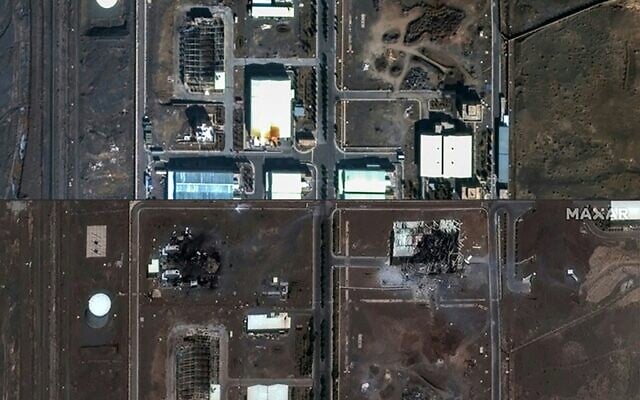
EU foreign policy chief Kaja Kallas said ”we agreed that we will discuss nuclear but also broader issues that we have, and keep the discussions open.”
The diplomats gave few details and took no questions.
Ahead of the meeting, Araghchi said Iran has “nothing to discuss” with the US as long as Israel continues its strikes on Iran, but is open to “dialogue, not negotiations,” with others.
European ministers spoke ahead of the meeting with US Secretary of State Marco Rubio, who signaled that Washington was open to direct talks even as it considers joining Israel’s strikes on Tehran’s nuclear program, the sources said.
The foreign ministers from Britain, France and Germany — the so-called E3 nations — as well as EU foreign policy chief Kaja Kallas also held a separate meeting in Geneva before meeting Araghchi.
Two diplomats said Araghchi would be told at the meeting that the US is still open to direct talks. But expectations for a breakthrough are low, diplomats say.
A senior Iranian official told Reuters that Iran is ready to discuss limitations on its uranium enrichment, but said the prospect of zero enrichment, as demanded by Israel and the US, would undoubtedly be rejected, especially while Israel was attacking.
Israel says its sweeping assault on Iran’s top military leaders, nuclear scientists, uranium enrichment sites, and ballistic missile program is necessary to prevent the Islamic Republic from realizing its avowed plan to destroy the Jewish state. Iran has retaliated with deadly ballistic missile attacks across Israel.
Lammy said that “a window now exists within the next two weeks to achieve a diplomatic solution.” He traveled to Geneva after meeting in Washington with Rubio and with the US special envoy to the Middle East, Steve Witkoff, who had been holding nuclear talks with Araghchi in the weeks before the war with Iran.
Two European diplomats said the Europeans did not believe that Israel would accept a ceasefire in the immediate term and that it would be difficult for Iran and the US to resume negotiations. That meant they would use Friday’s talks to test Iran’s appetite to begin negotiations with the E3 immediately.
The diplomats said the proposal would center on a parallel track in negotiations, initially without the US, on a new deal that would involve tougher inspections, also potentially even on Iran’s ballistic missile program, while allowing the country some notional enrichment capacity.
Given the escalation in the conflict, the two sides would aim for a quick political framework to get concessions from Iran and a ceasefire before entering in-depth negotiations. A third European official said he was not optimistic, as the E3 demands were quite extensive and Iran still had some strength.
While diplomats did not expect a breakthrough in Geneva, they said it was vital to engage with Iran because once the war stopped, the nuclear issue would remain unresolved given that Tehran would still retain the scientific know-how.
The E3 nations played an important role in the negotiations over the original 2015 nuclear deal between Iran and world powers. But they have repeatedly threatened to reinstate sanctions that were lifted under the deal if Iran does not improve its cooperation with the UN nuclear watchdog, the International Atomic Energy Agency.
US President Donald Trump exited the deal in 2018, during his first term, and reinstated sanctions on the Islamic Republic. The White House said Thursday that he would decide in the coming two weeks whether to join Israel’s attacks in Iran.
In an interview aired Friday by Iranian state television, Araghchi said that “in the current situation, as the Zionist regime’s attacks continue, we are not seeking negotiations with anyone.”
He said that “we have nothing to discuss with the United States, which is a partner in these crimes,” and that Tehran rejected negotiations with the Americans.
”As for others, if they seek dialogue, not negotiations, which don’t make sense right now, we have no problem with that,” he added.
Just before the meeting in Geneva, Araghchi made a brief appearance before the UN Human Rights Council in Geneva. He said that Israel’s “attacks on nuclear facilities are grave war crimes,” and insisted that “we are entitled … and determined to defend our territorial integrity, national sovereignty and security with all force.”
While Iran publicly denies seeking nuclear weapons, it has amassed uranium enriched to 60% — far beyond what is needed for civilian uses and a short step away from weapons-grade.
Germany’s foreign minister acknowledged that years of efforts to relieve concerns about the possibility of Iran developing a nuclear weapon haven’t succeeded, but said it’s worth talking now.
“If there is serious and transparent readiness by Iran to refrain from this, then there is a real chance of preventing a further escalation of this conflict, and for that every conversation makes sense,” Wadephul said in a podcast released by broadcaster MDR on Friday.
Wadephul said US officials “not only know that we are conducting these talks but are very much in agreement with us doing so — so I think Iran should now know that it should conduct these talks with a new seriousness and reliability.”
Before traveling to Geneva on Friday, Wadephul stressed that “it’s Iran’s move now.”
French Foreign Minister Jean-Noël Barrot spoke by phone with Rubio on Thursday evening. A French diplomatic official, who was not allowed to speak publicly on the issue, said Barrot detailed the purposes of the Geneva meeting and Rubio “stressed that the US was ready for direct contact with the Iranians at any time.”

